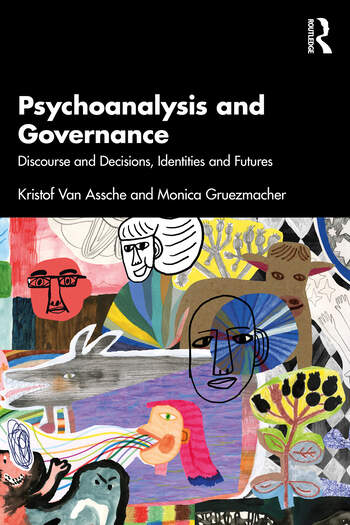Psychoanalysis and Governance: Discourse and Decisions, Identities and Futures

Book Details
- Publisher : Routledge
- Published : 2025
- Cover : Paperback
- Pages : 208
- Category :
Psychoanalysis - Category 2 :
Lacanian Psychoanalysis - Catalogue No : 97947
- ISBN 13 : 9781032696683
- ISBN 10 : 1032696680
Reviews and Endorsements
Studies of governance, with the exception of those inspired by Foucault, have largely been dominated by institutional and statist approaches and typically have only examined the state side of civil society-state relationships. These approaches often adopt a technocratic stance, analyzing governance relations in terms of their capacity to undermine or support state aims. In this innovative text, Van Assche and Gruezmacher argue persuasively that analyzing governance regimes and arrangements using insights from the field of psychoanalysis can improve our understanding of what governance is all about, as a needed antidote to more orthodox approaches.
Michael Howlett, Simon Fraser University
Lacanian and other psychoanalytically inspired ideas are highly apposite to our socio-political present. Kristof van Assche and Monica Gruezmacher offer an accessible, innovative framework for empirical understanding of governance strategies and for formulating principles for reinterpretation and potential evolution of communities. Presuming no prior knowledge of psychoanalytic concepts, the authors of this stimulating book emphasise the role of narratives in exploring governance paths and in conceiving new pathways through processes of self-analysis, visioning and strategizing. With the planet facing catastrophe, can we afford not to question ourselves, our certainties and desires?
Jean Hillier, RMIT
Kristof Van Assche and Monica Gruezmacher have made a decisive contribution not just to our understanding of governance but also to how we think of the political value of psychoanalysis. Their book shows us in breathtaking detail how psychoanalysis can contribute to a positive theory of self-rule. Through the idea of self-analysis, they unleash the positive political valence of psychoanalysis in a completely new way. In the process, they produce what will surely be the work of reference for any consideration about the relationship between psychoanalysis and how we govern ourselves.
Todd McGowan, University of Vermont

